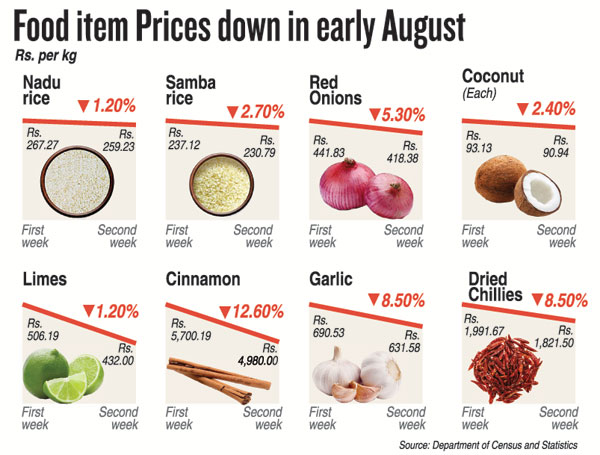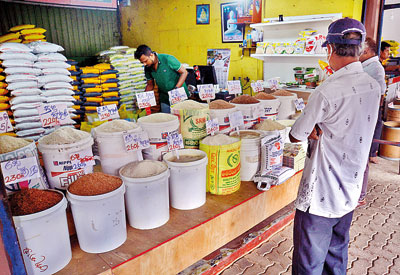News
CAA ready to provide rice at affordable prices–but farmers allege privatisation conspiracy
View(s):- Vendors at Dambulla Economic Centre selling at their own prices to get rid of stocks
- Coconut growers get Rs. 55 to Rs. 60 at the auction, traders sell at more than Rs. 100
By Senuka Jayakody
The Consumer Affairs Authority (CAA) has convinced supermarkets to provide rice at revised prices, but it has not been successful in getting some retail shops to follow instructions, its chairman Shanta Niriella said–but farmers leaders allege there is a conspiracy to hand over the rice market to private business companies.
The CAA chairman said they have taken measures to fix the prices, despite many traders saying their current stocks were bought at old prices and they were unable to reduce the prices. He said high transport charges were also being cited as reasons for the traders not to bring down prices.
“A hire from Kataragama to Colombo costs Rs. 75,000. The high labour costs are also being cited,” he said.
The CAA had arrested traders, who did not display the prices of goods in front of their shops. They were produced in the Magistrate courts.
Meanwhile, with the harvesting season now in progress, the Agriculture Ministry’s Paddy Marketing Board said from this week it would buy nadu rice at Rs. 120, samba at Rs. 125 and keeri samba at Rs. 130 a kilo.
An Agriculture Ministry spokesperson said the Government had allocated two billion rupees to buy about 30,000 tonnes of paddy from farmers.
The Ministry had requested farmers to sell the paddy they had cultivated through their hard work to the PMD at the high price of Rs. 120 a kilo, instead of lower prices offered by private companies.
The Ministry also said vegetable prices had not been reduced due to high fuel prices, and not due to a lack of vegetables. To secure fuel for the agricultural sector, the Ministry has appointed an officer to coordinate with the Petroleum Corporation.
All Island Farmers Federation Secretary T. B. Sarath claimed government pricing for paddy purchases was a conspiracy to hand over a rice monopoly to the private sector.
Mr. Sarath complained the Government prices were not fair, alleging the prices were decided based on the views of business companies and not farmers.
He said the government had promised to buy dry paddy at Rs. 120 a kilo, while private companies were offering Rs. 115 to Rs. 120 a kilo for wet paddy.

Mr. Sarath said this would force farmers to sell their crops to the private sector and there would be a rice monopoly for the private sector.
He predicted that following the establishment of a rice monopoly, the market prices would rise to more than Rs. 200 by the start of next month.
“The rice production would be reduced by 40% this season. Low fuel would cause the upcoming Maha season to be a failure as well,” he said.
Another major crop affected by market prices was coconut. It contributes Rs. 850 million of Sri Lanka’s foreign income.
Coconut Growers’ Association President Jayantha Samarakoon said coconut prices which were decided in an auction, were between Rs. 55 and Rs. 60.
If the increased prices of fuel and other necessities were considered, coconut should be bought for at least Rs. 70, he said. Mr. Samarakoon also said businessmen who buy their coconuts were profiting, as market prices in Colombo for coconut were more than Rs. 100.
“Coconut growers are cutting trees, selling their land and leaving the country,” he complained.
The Manning Market Deputy Chairman Prabath Susantha, agreed that intermediaries were profiting from the price changes.
Despite prices being reduced, the Manning market price for nadu rice was Rs. 240 a kilo yesterday. He complained about high fuel prices and said stocks were bought while fuel prices were still high.
Dambulla Economic Centre Chief Shantha Ekanayaka denied that the economic centre was profiting from the trading.
He said only small commissions were made from the produce; 50 cents for 10 kg, Rs. 1 for 30 kg, Rs. 3 for 60 kg, Rs. 4 for 80 kg and Rs. 5 for 100 kg upwards.
He also said vendors were working according to demand and supply. Therefore government prices were useless since even if prices of beans were Rs. 500 a kilo in the morning, by evening they would be reduced to Rs. 300 a kilo since vendors wanted to sell the stocks off.
| Egg prices fixed A maximum retail price for eggs has been announced by the Consumer Affairs Authority (CAA). Accordingly the prices of white eggs has been fixed at Rs. 43, while brown or red eggs were reduced to Rs. 45, by the CAA. No manufacturer, producer, supplier, distributor or trader can sell eggs above the maximum retail price according to the decision which has been gazetted. | |
 Not everyone is selling rice at the revised price. Pic by Eshan Fernando |
The best way to say that you found the home of your dreams is by finding it on Hitad.lk. We have listings for apartments for sale or rent in Sri Lanka, no matter what locale you're looking for! Whether you live in Colombo, Galle, Kandy, Matara, Jaffna and more - we've got them all!

